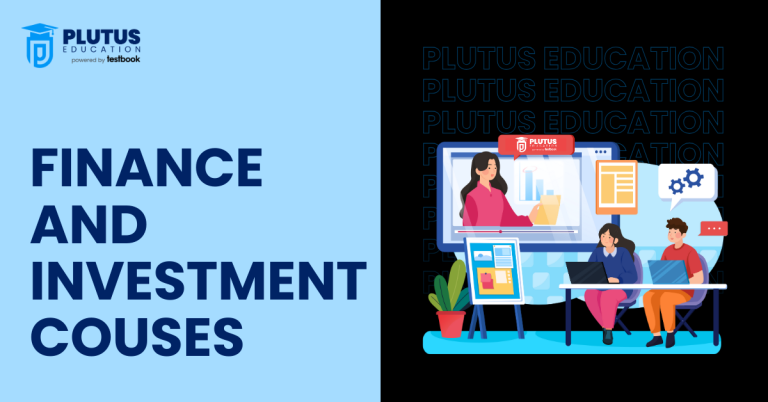Today, more people are seeking to take control of their finances and make them grow. This is why finance and investment courses are gaining popularity. These courses empower you with the knowledge of how to manage your money, create a budget, invest in stocks, and plan for your future. Whether you choose to take these courses online or offline, the end result is a sense of control and a step towards financial empowerment. Finance and investment courses are truly inclusive. They cater to both beginners and professionals, regardless of their background or expertise in math. These courses start from the basics and use real-life examples, making them accessible to students, job seekers, business owners, and homemakers alike. These courses also help you understand the value of money. You learn how to save, where to invest, and how to reach your goals. Some courses even teach about the stock market, mutual funds, tax planning, and digital finance. In today’s digital world, these skills are important for everyone.
Why Take Finance and Investment Courses in 2025?
Learning finance and investment is no longer just for professionals. It is for every person who wants to earn more, save better, and grow wealth. Whether you are a student, fresher, or working adult, financial knowledge is now a must.
These courses are not just about theory; they prepare you for real-life financial decisions. They equip you with the practical skills and knowledge needed to manage your money effectively and make smart investment choices. Many people earn well but still face money problems. That happens because they don’t learn personal finance or investment skills in school. Finance and investment courses fill that gap. They help you avoid bad decisions and teach smart habits.
Courses are simple, easy to follow, and come with useful tools. You can learn budgeting, goal setting, banking, investment plans, and even emergency savings. Some courses also help you start investing in small amounts.
Key reasons to take finance and investment courses:
- You learn how to plan your money from start to end.
- You avoid common mistakes like overspending or poor investments.
- You understand how banks, credit cards, and loans work.
- You start saving with purpose.
- You get ready for bigger goals like buying a house or retirement.
Even if you already work in finance, these courses keep you updated with new tools and ideas. You can also move into roles like financial advisor or analyst after these programs.
What Do Finance and Investment Courses Teach?
These courses cover a wide range of financial topics in a comprehensive and structured manner. They typically start with the fundamentals of personal finance and progress to cover savings, tax, and various investment tools.
Learn how to take full control of your money.
A good finance and investment course teaches not just theory but also practical steps. You learn how to plan, track, and grow your money with real examples. Some courses also use case studies or market simulations.
| Module | Topics Included |
| Budgeting | Expense tracking, monthly planning, goal setting |
| Saving Plans | Emergency fund, recurring deposits, retirement |
| Banking & Credit | Credit score, loans, interest rates, EMIs |
| Investing Basics | Types of investment, risk vs return, SIP |
| Stock Market | Equity, trading, demat account, stock analysis |
| Mutual Funds | NAV, SIP, index funds, portfolio building |
| Tax Planning | Income tax slabs, filing returns, Section 80C |
| Retirement Planning | EPF, NPS, pension options |
You also learn the basics of inflation, compound interest, and diversification. Most courses use charts, checklists, and templates to make things easier.
Some courses go even deeper and teach asset allocation, wealth creation, and real estate investments. These lessons help both first-time learners and mid-career professionals.
Types of Finance and Investment Courses Available
You can find different types of courses based on what you want to learn. Some courses are short and cover just one topic. Others are longer and cover many areas together.
Choose from beginner to advanced programs based on your needs.
If you are new to finance, start with a basic course on personal finance. If you want to learn about the stock market, choose one that focuses only on equity investments. If you want to build a career, pick a full diploma or certification.
- Personal Finance Courses – For saving, budgeting, and planning.
- Stock Market Courses – For trading, technical analysis, and long-term investing.
- Mutual Fund Courses – For SIP, fund comparison, and portfolio planning.
- Taxation Courses – For tax return filing and investment-based savings.
- Wealth Management Diplomas – For students and professionals aiming for finance jobs.
- Financial Planning Certification – For those who want to become certified planners.
Some courses come with quizzes, final tests, and project work. These give you hands-on practice and make your learning better.
If you want government-approved learning, check NSDC or Skill India. They offer free and certified courses through local training centres and online, too.
Best Online Platforms for Finance and Investment Courses for freshers
Many online websites now offer finance courses that you can learn from home. Some offer free courses, while others offer paid ones with certificates.
Learn at Your Own Pace and Get a Valid Certificate
Online learning offers unparalleled flexibility. You can learn at your own pace, from the comfort of your home, using just a phone or computer. Most platforms also provide video lectures, PDFs, and live doubt-solving sessions, making the learning process interactive and engaging.
| Platform | Course Type | Fee Range |
| Udemy | Beginner to advanced | ₹500–₹4,000 |
| Coursera | University-backed | ₹2,000–₹8,000 |
| Zerodha Varsity | Free stock market modules | Free |
| Skillshare | Practical personal finance | ₹1,000/month |
| NSE Academy | Stock, tax, and finance | ₹3,000–₹10,000 |
| UpGrad | Full-time diploma and certifications | ₹25,000+ |
| NPTEL/SWAYAM | Govt-certified | Free to ₹2,000 |
Most of these platforms give lifetime access. You can watch the course anytime, even after months.
Look for platforms that offer quizzes, downloadable resources, real examples, and projects. Also, check if they give a valid certificate and career support.
Job Opportunities After Finance and Investment Courses
These courses don’t just help in my personal life. They also open doors to many finance jobs. If you want to work in banks, mutual funds, fintech, or as an advisor, these skills are a must.
Companies now want people who know money handling, investment products, and tools like Excel, Power BI, or even AI in finance. These courses give you the right foundation.
| Job Title | Industry | Monthly Salary |
| Financial Planner | Investment firm | ₹25,000–₹60,000 |
| Equity Research Analyst | Stock Market | ₹30,000–₹80,000 |
| Mutual Fund Advisor | AMCs/Banks | ₹20,000–₹50,000 |
| Tax Filing Executive | CA firms | ₹15,000–₹40,000 |
| Investment Assistant | Insurance/Finance | ₹18,000–₹45,000 |
If you want to go higher, you can take more courses like CFA, CFP, NISM, or CWM after finishing your basic course.
These roles offer great career growth and chances to move abroad, too. With freelancing and remote jobs rising, many finance tasks can now be done from home.
How to Choose the Right Finance and Investment Course?
With so many choices, you may get confused. Don’t worry. You need to follow some simple tips before joining. Some courses teach theory only. Others focus on hands-on skills. Pick one that gives you real value and suits your level.
Checklist to Choose the Best Course:
- Does it match your current level (beginner, intermediate)?
- Does it give a valid and respected certificate?
- Does it include hands-on tools and case studies?
- Is it flexible (videos, mobile access)?
- Do reviews say it helped other learners?
- Does it cover your topic of interest—like tax, mutual fund, or stock?
You can start with a free course. Once you like the topic, move to advanced or paid ones. Always check the content, duration, and outcome before joining.
Finance and Investment Courses FAQs
1. Are finance and investment courses good for beginners?
Yes. Many courses start from scratch and explain everything in easy words.
2. Can I take these courses while working or studying?
Yes. Most courses are self-paced and online.
3. Do I need any prior background in finance?
No. You can join even if you studied arts, science, or commerce.
4. Will I get a job after the course?
You increase your chances if you apply what you learn and take certifications.
5. Are these courses expensive?
No. Many start at ₹500 or are even free. You can upgrade later.
6. Can homemakers or freelancers take these courses?
Yes. These courses suit anyone who wants to manage money better.


